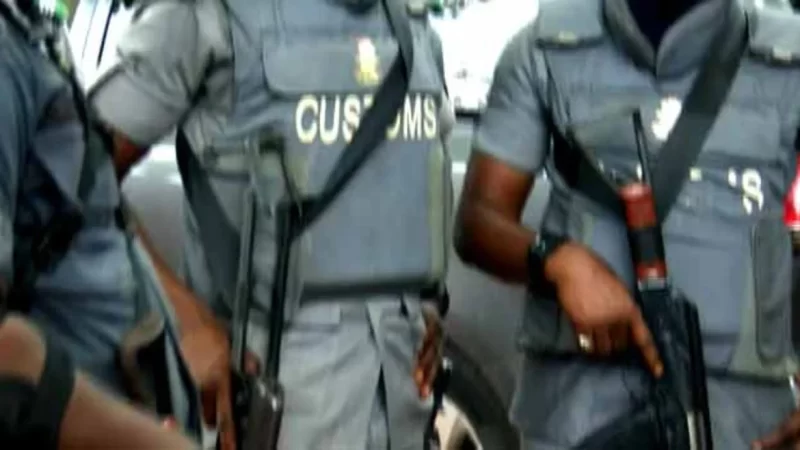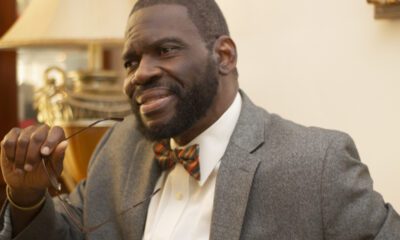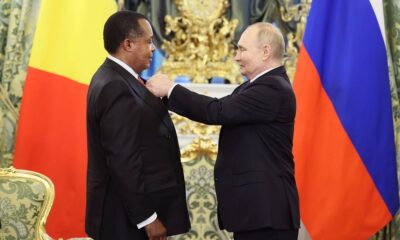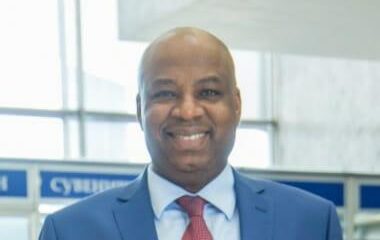National Issues
Reinventing The Customs -By Pius Mordi
A good part of the rise in revenue is accounted for by the fall out of the floating of the naira by the federal government. However, shippers have acknowledged the improvement in the turn around time for clearing of goods. It is down to Adeniyi’s adoption of the oft recommended introduction of measures to minimise the role of human element in the clearing process.

Last week, Mr. Adewale Adeniyi, Comptroller General of the Nigeria Customs Service (NCS), marked his first year in office. That he is the first career officer from the Service to be appointed Comptroller General in eight years was not lost on the rank and file. For the two terms of Muhammadu Buhari as President, Hameed Ali, a retired Army colonel, was his preferred choice to head the revenue generating agency. In appointing Ali who trained as an infantry officer, Buhari said his choice would modernise and professionalise the service.
It was a strange move given Ali had no training on trade facilitation or had an any association with the economy while in Service. But it was not unknown. Before him, S. O. G. Ango, a serving Brigadier General at the time, was appointed Sole Administrator of the Customs by late Sani Abacha after he took over the government in November 1993. Ango remained until 1999 even though he was initially projected to stay for only one year.
Perhaps no other organisation illustrates the emasculation and politicisation from government as the Nigeria Customs and its a development that become self inflicted hurt on the national economy . At the time of its establishment in 1891, the Customs was saddled with the responsibilities of revenue collection at the seaports and checking smuggling at the borders. Although a revenue collection agency, it is still a paramilitary organisation with its having to undergo professional training not just on the dynamics of revenue collection but on weapon handling and coastal navigation.
With the evolution of the Customs into a cash cows, its been subjected to bridled politicisation and emasculation by successive military regimes.
In 1988, the Federal Military Government under Ibrahim Babagida established the Federal Environmental Protection Agency (FEPA). In no time, the new agency secured approval to deploy its operatives to the ports ostensibly to ensure that toxic materials are not shipped into the country. This was followed four years in 1993 when Decree 15 was promulgated. The Decree set up the National Agency for Food and Drug Administration and Control (NAFDAC) as a professional agency to fight the proliferation of fake and substandard drugs. Like FEPA that came before it, NAFDAC routinely got approval to also have its men operate at the ports.
As if that was not enough, on came the National Drug Law Enforcement Agency (NDLEA) in December 1999 via Decree 48 with the assignment of exterminating illicit drug trafficking and consumption. Again, its officials are also authorised to be at the ports and, like the organisations before it, be part of the process of clearing goods.
Apart from the military created agencies, there are the statutory ones already in the ports, including the Police, Port Health Service and the Nigerian Ports Authority (NPA).
Remarkably, the Customs has always had units with trained personnel that undertook the supervision and processing of goods associated with drugs, prohibited goods and illicit drugs.
At the end, Nigerian ports became notorious as the most inefficient and expensive seaports in the west and central African subregion. It was a situation that cost the country dearly. Despite efforts and recommendations to prune the number agencies involved in the clearing process to make the ports more competitive and efficient with its peers in the west Africa, the agencies which had also been joined by the Department of State Services (DSS) successfully resisted all efforts to reform the process. Such convoluted had the clearing process in Nigerian ports become that many importers resorted to diverting their consignments to neighbouring West African ports, especially the next door port of Cotonou in Benin Republic whose government evolved processes and policies that made their ports attractive to foreign ships and shippers.
Precious time was lost in reversing the situation to the coming of Hameed Ali, Comptroller General who appointed serving military officers as members of his inner circle, ignoring career senior officers. When President Bola Tinubu announced the appointment of Adewale Adeniyi as the Customs boss in June 2023, there was relief among maritime operators that finally, reforms will be effected to ease the burden on the shipping community.
Addressing a press conference to mark his first year in office, Adeniyi seem not to have disappointed.
He reported a remarkable 74 percent growth in revenue collection over the past year, recording a total revenue collection of N4.49 trillion between June 2023 and May 2024, compared to the N2.58 trillion collected during the corresponding period of the previous year.
According to him, the achievement was underpinned by a sustained increase of 70.13 percent in average monthly revenue collection compared to the previous year. The Customs recorded an average monthly revenue collection of N343 billion, compared to the N202 billion monthly average.
“Notably, there was a substantial 122.35 percent rise in revenue collection during the first quarter of 2024 compared to the same period in the previous year”, he said.
The gains, Mr. Adeniyi noted, were attributable to the N15 billion recovery by the Revenue Review Performance Recovery exercise; N2.79 billion recovered from the 90-day window for the regularisation of the documents of uncustomed vehicles as well as N1.5 billion recovered from the decongestion of 1,705 overtime containers and 981 vehicles from the port.
A good part of the rise in revenue is accounted for by the fall out of the floating of the naira by the federal government. However, shippers have acknowledged the improvement in the turn around time for clearing of goods. It is down to Adeniyi’s adoption of the oft recommended introduction of measures to minimise the role of human element in the clearing process. Computerisation of the cargo delivery process has had the twin effects of reducing the duration of the process and a corresponding reduction in cost.
But there is a limit Adeniyi’s reforms can go. Without the other agencies keying into it and if they continue the tortuous manual procedure, the improving efficiency in the Customs will sooner a later be rolled back. In this Fourth Republic, Nigeria has been run by presidents with military background for 16 of its 25 years. The presidents – Olusegun Obasanjo and Buhari – remained loyal to the system bequeathed by the previous military regimes. It will require a monumental political will from President Tinubu to take the bold decision to deepen the reforms and expel the agencies with dubious roles from the seaports.
Postscript
Tinubu’s new jets
It was one-time Minister of Aviation, Nsikak Essien, that labelled commercial planes flying on local route as flying coffins in ’90s following a spate of deadly crashes.
Now, we are told that the six jets on the presidential fleet are no longer fit to fly the president. It has elicited condemnation from many.
Bayo Onanuga, one of President Tinubu’s media handlers, berated Peter Obi for calling for the cancellation of the approval already given by the National Assembly for the two new planes to be acquired for Aso Rock. Godswill Akpabio, Senate President, stopped shot of using the expression of his late kinsman in giving express approval for the arrangement. That will bring the presidential fleet to eight jets apart from the existing helicopters.
They were said to have been acquired in 2007 under then President Obasanjo, making them about 17 years old or thereabout.
So what happens to the “old” jets? It’s probably comforting to the masses to take solace in the fact that despite their travails, the President travels in optimum comfort, safety and luxury while he labours to fix the country.










